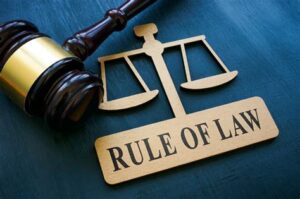Back to: Religion and National Value JSS2
Welcome to class!
In today’s class, we’re going to be talking about The Rule of Law. I trust you will enjoy the class!
The Rule of Law
Explaining The Rule of Law

Core Principle: No one is above the law, not even those in power. Everyone, regardless of religion, ethnicity, or social status, is subject to the same laws.
Equality Before the Law: Everyone is treated equally under the law, with no special privileges or exceptions.
Fairness and Justice: The law is applied consistently and impartially, ensuring that justice is served.
Protection of Rights: The law safeguards fundamental human rights, such as freedom of speech, religion, and assembly.
The Rule of Law in Nigeria’s Constitution

The Nigerian constitution is the supreme law of the land, and all other laws must conform to it.
Power is divided among three branches of government – the legislature, executive, and judiciary – to prevent abuse of power and ensure checks and balances.
Chapter IV of the constitution enshrines the fundamental rights of Nigerians, including the right to life, dignity, and fair hearing.
The judiciary is independent and impartial, upholding the rule of law and protecting citizens’ rights.
Religious Teachings and the Rule of Law

Islam:
- Justice (Adl): A core Islamic principle, emphasizing fairness, equality, and the avoidance of oppression.
- Rule of God (Hakimiyyah): Islam upholds the sovereignty of God’s law, which is the basis for all human laws.
- Consultation (Shura): Islamic governance emphasizes consultation and consensus-building, promoting inclusivity and fairness.
Christianity:
- Golden Rule: “Do unto others as you would have them do unto you,” promoting empathy and fair treatment of others.
- Love Thy Neighbor: Emphasizes treating everyone with love and respect, regardless of their background or beliefs.
- Justice and Righteousness: Christian teachings advocate for justice, upholding the rights of the oppressed and marginalized.
Traditional Religions:
- Community Values: Many traditional religions emphasize communal values, social harmony, and respect for authority, which align with the principles of the rule of law.
- Truth and Honesty: Traditional religions often value truthfulness and integrity, crucial for upholding the rule of law.
- Respect for Elders: Respecting elders and traditional leaders promotes social order and stability, essential for the rule of law to function.
National Values and the Rule of Law
- Discipline: The rule of law requires citizens to obey laws and regulations, promoting order and stability.
- Integrity: Upholding the rule of law demands integrity and honesty from both citizens and those in power.
- Social Justice: The rule of law aims to create a just and equitable society, where everyone has equal opportunities and access to justice.
- Patriotism: Respecting and upholding the rule of law is a demonstration of patriotism, contributing to the development and progress of the nation.
We have come to the end of today’s class. I hope you enjoyed the class!
In the next class, we shall be discussing protection of human rights and the rule of law.
In case you require further assistance or have any questions, feel free to ask in the comment section below, and trust us to respond as soon as possible. Cheers!
Question Time:
- Explain the core principle of the Rule of Law in your own words.
- How does the Rule of Law ensure fairness and justice in society?
- Identify three specific ways in which the Nigerian constitution upholds the Rule of Law.
- How does corruption undermine the Rule of Law in Nigeria?
- Give an example of how political interference can weaken the Rule of Law.
